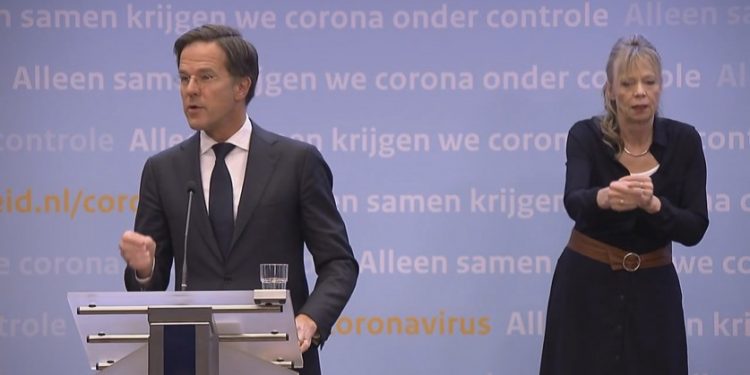The NL Times also published a summary of Prime Minister Mark Rutte’s address to the nation in which he announced that the hard lockdown would be extended into February to stop the spread of the SARS-CoV-2 coronavirus.
On Tuesday, Prime Minister Mark Rutte announced that the hard lockdown the Netherlands has been in since December 15, in an attempt to decrease the number of coronavirus infections, will be extended until February 9.
While the Netherlands has started vaccinating against the virus, it will still be some time before enough people are vaccinated for daily life to return to something more like normal. Constant vigilance is still required to keep the number of coronavirus infections as low as possible, especially given that new and more contagious strains of are the virus popping up.
The number of daily infections started to show a decrease after the hard lockdown was implemented on December 15. The next goal is to decrease infections more and more quickly, so that the number of patients in hospital and intensive care also decreases, the government said.
Here follows a full list of restrictions in place until at least February 9:
Retail, gyms and services
- All non-essential stores will remain closed.
- Essential stores include supermarkets, auto mechanics, bakeries, banks, bodegas, business-to-business wholesalers, butchers, consumer goods repair shops, drug stores, dry cleaners, eye and ear care centers, fish shops, flower stands, laundromats, liquor stores, pet shops, petrol stations and their shops, pharmacies, postal service points, and shops at filling stations.
- Amusement parks, casinos, cinemas, museums, theaters, sex shows and zoos will be closed.
- Close-contact professional services, like beauticians, hairdressers, sex workers and some massage providers will be closed.
- Healthcare providers, including dentists, eye care providers, midwives, optometrists, and physiotherapists will be allowed to remain open.
- Gyms, swimming pools, and saunas will be closed.
- DIY shops will be allowed to distribute goods to customers who order online for pick-up.
- Libraries will be allowed to stay open for the collection or return of books and media.
- Local community centers will remain open for vulnerable people.
Education and Childcare
- Primary schools and secondary schools will be closed to in-person education. Online education will be offered in its place.
- Exceptions to school closings include the children whose parents work in a vital profession, and students in their pre-exam or exam year.
- Daycare facilities will be closed. Childcare will be available for children whose parents work in a vital profession and children in a more vulnerable position.
- Higher education facilities will be closed, with classes moving online.
- Vocational education and trade schools will largely remain open.
At Home
- Households will be allowed to welcome a maximum of two guests aged 13 and over.
- Children aged 12 and below are exempted from the household guest limit.
- Religious facilities and houses of worship will remain open.
Hotels, hospitality and coffeeshops
- Hotels will remain open. Food and beverage service, including room service, will no longer be allowed.
- Bars, cafes and restaurants will remain closed, as they have since mid-October.
- Bars, cafes and restaurants will be allowed to continue serving takeaway clientele.
- Coffeeshops will also be allowed to sell their products to takeaway clientele.
Sport and fitness
- Gyms, swimming pools, and saunas will be closed as will all other indoor sports facilities.
- Outdoor sports is allowed in groups of no more than two people at a distance of 1.5 meters apart.
- Kids up to the age of 17 are allowed to exercise in teams, and can play matches, but only outside
- Team trainings and intra-squad competitions are no longer allowed.
- Outdoor sports venues may remain open for people under the age of 18.
- Elite professional sports competitions including the Eredivisie football matches, will be allowed to continue.


















